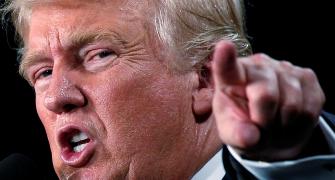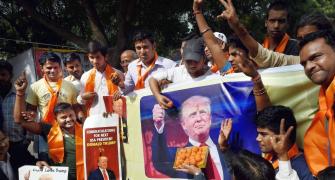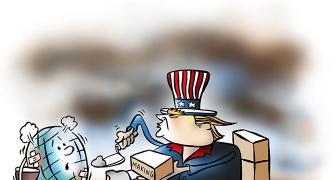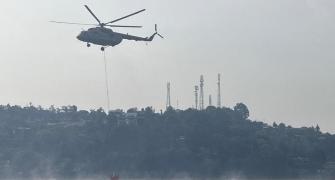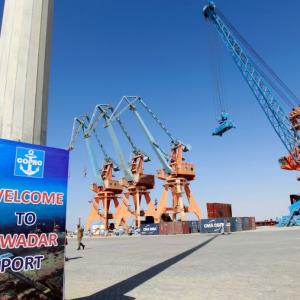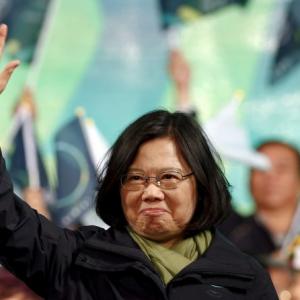Donald Trump is believed to be the first US President or President-elect to have spoken to a Taiwanese leader since 1979, when the US severed diplomatic ties with Taiwan after its recognition of the People's Republic of China, points out former RA&W officer Jayadeva Ranade.
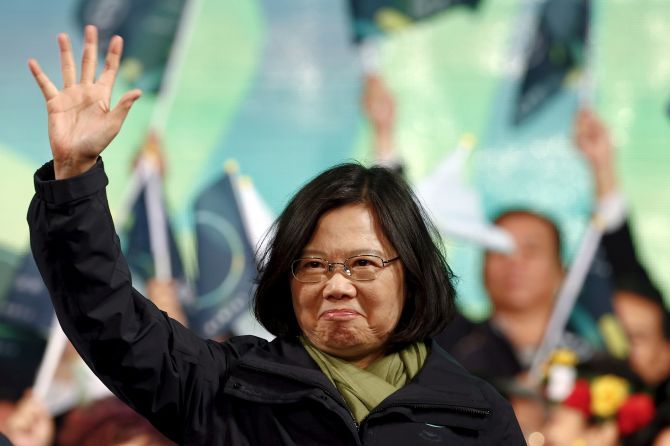 US President-elect Trump's 10-minute conversation with Taiwan's President Tsai Ing-wen on December 2 has created major ripples in Washington and Beijing with some analysts anticipating that it could signal the beginning of a more robust posture in Asia by Trump's administration.
US President-elect Trump's 10-minute conversation with Taiwan's President Tsai Ing-wen on December 2 has created major ripples in Washington and Beijing with some analysts anticipating that it could signal the beginning of a more robust posture in Asia by Trump's administration.
Trump is believed to be the first US President or President-elect to have spoken to a Taiwanese leader since 1979, when the United States severed diplomatic ties with Taiwan after its recognition of the People's Republic of China.
The unprecedented phone conversation was initiated by Tsai Ing-wen through Edwin Feulner, founder of the Washington-based Heritage Foundation and a member of Trump's team since August.
A US official clarified that the Trump transition team did not inform the Obama administration in advance of the conversation.
A statement issued by Trump's office, after the Financial Times disclosed the telephonic exchange, said the two leaders noted the 'close economic, political, and security ties' that exist between Taiwan and the United States and that Trump 'congratulated President Tsai on becoming president of Taiwan earlier this year.'
In a tweet, Trump observed it was 'Interesting how the US sells Taiwan billions of dollars of military equipment but I should not accept a congratulatory call.'
Coming just a year before the important 19th Party Congress of China's Communist party, news of the conversation would have discomfited Beijing which, just a day earlier, had been assured by Dr Henry Kissinger while meeting Chinese President Xi Jinping that Sino-US relations would be stable under Donald Trump.
Beijing's reaction was prompt without escalating matters. China's Foreign Minister Wang Yi, who is a strong candidate for promotion at the 19th Party Congress, quickly described it as a 'little trick' played by Taiwan.
Later at a forum in Beijing Wang said, 'This will never change the one-China consensus reached by the international community. I also believe that this will never change the one-China policy recognised by the US over the past years. Sticking to the one-China principle is the cornerstone of the healthy development of Sino-US ties. We (hope there won't be) any disturbance and damage to this political foundation.'
Shi Yinhong, professor of international relations at Renmin University in Beijing, however, struck a contradictory note and said Trump was sending a 'very clear' message. He asserted that 'The US President-elect hates China and will encourage Tsai to resist pressure from the mainland.'
Trump's gesture coincides with the tension in relations that has existed between China and Taiwan since Tsai Ing-wen, leader of the pro-independence Democratic Progressive Party, formally assumed office as Taiwan's President on May 20, 2016.
China has set considerable store by the '1992 consensus' and feels that unless Tsai Ing-wen and the Democratic Progressive Party accept the 1992 consensus and agree that both sides of the Taiwan Strait belong to one China, it would mean they are changing the status quo.
At the National People’s Congress session in Beijing in March, Xi Jinping had spelt out three tough new propositions and warned that China 'will resolutely stop any form of behaviour having to do with Taiwan independence or separatism and safeguard the country’s sovereignty and territorial integrity.'
Tsai Ing-wen's inaugural speech on May 20 was carefully worded not to give China any offence, but she also avoided any indication that she endorses the '1992 consensus.'
President Tsai did say though that the two sides reached 'various joint acknowledgments and understandings in 1992,' and she 'respected that fact,' but simultaneously underlined Taiwan's separate identity by declaring she would continue to be guided by the constitution of the Republic of China.
In a bid to assuage Beijing and maintain the status quo, she assured that her administration would 'work to maintain existing mechanisms for dialogue and communications across the Taiwan Strait.'
At the same time she stressed she would reduce Taiwan's over-dependence on China and look for other markets and singled out ASEAN and India -- the US, Japan and India were the only countries mentioned and the EU and ASEAN the only groupings.
This conversation between Tsai Ing-wen and Trump, whether by coincidence or otherwise, also comes amidst reports filtering out of Beijing that Xi Jinping is keen on resolving the issue of Taiwan's reunification with the mainland before the end of his tenure as president.
Separately, a recent article by Liu Xuejun and Liu Jun, two academics of China's Institute of International Studies at Yunnan University, blamed the United States for continuously interfering in cross-Strait relations and internationalising the Taiwan issue, adding that Taiwan's independence movement is among China's, and possibly the world's, tensest geopolitical situations.
The article observed that China had quickened the pace of détente in the last eight years, but the trend had been reversed with Tsai Ing-wen's election.
'China,' they said, is 'now preparing for a final solution by non-peaceful means, which is the last resort China would prefer to turn to.'
Jayadeva Ranade, a former Additional Secretary in the Cabinet Secretariat, Government of India, is President of the Centre for China Analysis and Strategy.
IMAGE: Democratic Progressive Party Chairperson and Taiwan's President Tsai Ing-wen greets supporters after her victory at party headquarters in Taipei. Photograph: Pichi Chuang/Reuters

